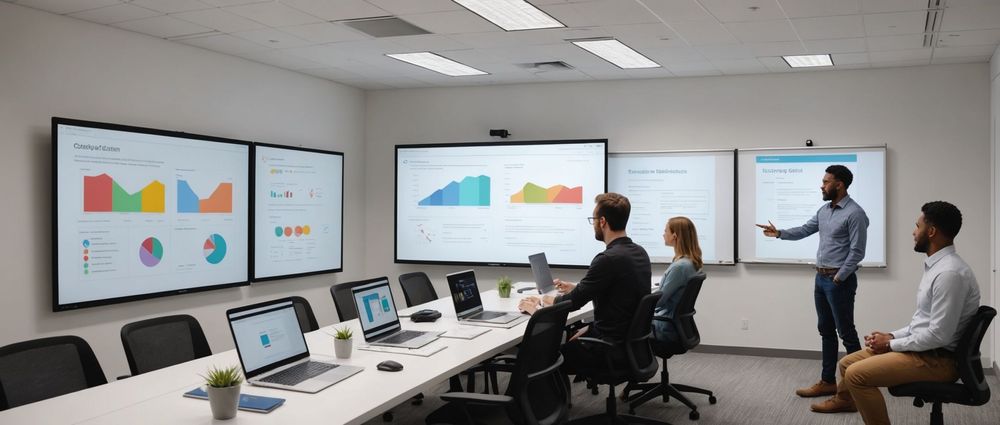15 SaaS Customer Retention Strategies That Actually Work

In the competitive landscape of SaaS, customer retention is not just beneficial—it’s essential. This article delves into 15 proven strategies to help SaaS businesses retain their customers effectively. From proactive onboarding to continuous engagement, these strategies are designed not only to keep your customers but also to transform them into loyal advocates for your brand.
1. Proactive Onboarding

An effective onboarding process sets the tone for a long-term relationship with your customers. It’s crucial to make the initial experience as smooth and informative as possible. Walk your customers through the essential features of your product and provide the necessary support to get them started. Utilize tutorials, webinars, and proactive customer support to ensure they feel confident using your software from day one. The more comfortable they are, the less likely they are to churn.
2. Regular Check-Ins

Regular communication can make a significant impact on customer satisfaction and retention. Schedule periodic check-ins to gather feedback and identify any potential issues before they escalate. Personalized emails and phone calls can demonstrate that you care about their experience and are committed to their success. Engage with them to understand their evolving needs and provide solutions that keep them satisfied with your product.
3. Personalized Customer Experience

Providing a personalized customer experience can significantly improve retention rates. Leverage customer data to tailor your interactions and offer customized solutions. Personalized marketing campaigns, in-app messages, and special offers based on user behavior make customers feel valued and understood. When customers sense that a product is designed to meet their unique needs, they are more likely to remain loyal.
4. Offering Valuable Content
Content is king, and this adage holds true in SaaS customer retention. Provide valuable content that educates and informs your users about maximizing the benefits of your software. Publish how-to guides, case studies, blog posts, and industry insights that address common challenges and showcase innovative solutions. Quality content positions your company as a thought leader in the field, fostering trust and encouraging ongoing engagement with your product.
5. Implementing a Customer Feedback Loop
Feedback is a goldmine of information that can guide your improvement efforts. Implement a robust feedback loop to collect and act on customer feedback. Use surveys, NPS (Net Promoter Score) systems, and direct customer interactions to gauge satisfaction and identify areas of improvement. Showing that you actively listen and respond to customer feedback enhances their trust in your commitment to their success.
6. Providing Exceptional Customer Support
Exceptional customer support can be a game-changer for retaining customers. Ensure your support team is well-trained, responsive, and equipped to resolve issues efficiently. Offer multiple support channels such as live chat, phone support, and email to cater to diverse customer preferences. A prompt resolution to their problems not only satisfies the customer but also reinforces their decision to continue using your product.
7. Building a Community
Creating a community around your product can foster a sense of belonging and loyalty among customers. Establish online forums, social media groups, and user events where customers can share experiences, ask questions, and network. A strong community can provide peer support, valuable insights, and a platform for customers to become advocates for your brand.
8. Offering Loyalty Programs
Loyalty programs can be a powerful incentive for customers to stay with your product long-term. Develop reward systems that offer benefits such as discounts, exclusive features, and early access to new updates. Recognize and reward your loyal customers to make them feel appreciated and valued, thereby enhancing their commitment to your SaaS solution.
9. Using Data Analytics
Data analytics can provide valuable insights into customer behavior and help you devise effective retention strategies. Analyze usage patterns, customer journeys, and churn data to identify trends and potential issues. Use this information to optimize your product, tailor your marketing efforts, and proactively address customer needs. Data-driven decisions can significantly enhance customer satisfaction and retention.
10. Conducting Regular Training and Webinars
Continuous learning opportunities keep customers engaged and informed. Organize regular training sessions and webinars to help users maximize the value of your software. These sessions can cover new features, best practices, and advanced functionalities. Providing ongoing education ensures that your customers are always getting the most out of your product, which can significantly reduce churn.
11. Enhancing Product Features
Regularly updating and enhancing your product can keep customers excited and engaged. Solicit feedback from your users to understand which features they value most and where improvements are needed. Roll out updates that address their needs and demonstrate your commitment to continuous improvement. Staying relevant with regular enhancements can prevent customers from seeking alternative solutions.
12. Setting Clear Expectations
Clear communication about what users can expect from your product is essential for customer satisfaction. Set realistic expectations during the sales process and ensure that your marketing messages accurately reflect your product’s capabilities. Transparency ensures that customers are not disappointed and can build a trusting relationship with your brand.
13. Monitoring Customer Health Scores
Customer health scores are a quantitative measure of the customer’s likelihood to churn. Develop a scoring system based on parameters like usage frequency, support ticket volume, and feedback. Monitor these scores regularly to identify at-risk customers and intervene with targeted support and engagement strategies. Proactively managing customer health can significantly improve retention rates.
14. Implementing Customer Success Managers
Customer Success Managers (CSMs) act as dedicated advocates for your customers, ensuring they achieve their desired outcomes with your product. Assign CSMs to key accounts to provide personalized attention and proactive support. Their role is to understand the customer’s goals, monitor their progress, and address any obstacles, making it easier for customers to see the value in continued use of your product.
15. Conducting Exit Interviews
When a customer decides to leave, conducting an exit interview can provide valuable insights into the reasons behind their decision. Use these interviews to gather honest feedback and identify any patterns in churn behavior. Understanding why customers leave can help you address underlying issues and improve your retention strategies for the future.
Conclusion
Customer retention in the SaaS industry is a continuous effort that requires a strategic approach. By implementing these 15 strategies, you can build lasting relationships, improve customer satisfaction, and ultimately increase your retention rates. Remember, a happy customer is not only more likely to stay but also more likely to recommend your product to others.
FAQ
Q1: What is customer retention in SaaS?
A1: Customer retention in SaaS refers to the ability to keep existing customers subscribed to your service over a long period. It involves various strategies aimed at ensuring customers continue to find value in your product, thereby reducing churn rates.
Q2: Why is customer retention important for SaaS businesses?
A2: Customer retention is crucial for SaaS businesses because acquiring new customers is often more costly than retaining existing ones. High retention rates indicate that customers are satisfied and see ongoing value, which can lead to long-term revenue growth and positive word-of-mouth promotion.
Q3: How can data analytics improve SaaS customer retention?
A3: Data analytics can help improve SaaS customer retention by providing insights into customer behavior, usage patterns, and potential issues. This information enables businesses to make data-driven decisions that enhance the customer experience and proactively address pain points, leading to higher satisfaction and retention rates.
Q4: What role do Customer Success Managers play in retention strategies?
A4: Customer Success Managers play a critical role in retention strategies by acting as dedicated advocates for customers. They provide personalized support, monitor progress towards goals, and address any obstacles that may arise. This focused attention helps ensure customers achieve their desired outcomes, making them more likely to continue using the product.
Q5: How can loyalty programs enhance SaaS customer retention?
A5: Loyalty programs can enhance SaaS customer retention by rewarding customers for their continued use and engagement with the product. These programs provide incentives such as discounts, exclusive features, and early access to new updates, making customers feel valued and appreciated, thus encouraging long-term loyalty.